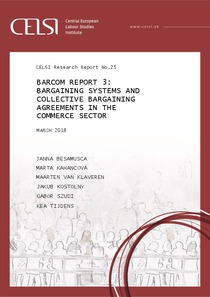BARCOM REPORT 3: Bargaining systems and collective bargaining agreements in the commerce sector
"Collective bargaining is an important instrument in wage-setting processes, but lacks underpinning with empirical data. Little is known about what exactly is agreed upon in collective bargaining. Few countries maintain databases with coded collective agreements; and agreements are coded for di...
| Main Authors: | , , , , , |
|---|---|
| Institution: | ETUI-European Trade Union Institute |
| Format: | TEXT |
| Language: | English |
| Published: |
Bratislava
2018
CELSI |
| Subjects: | |
| Online Access: | https://www.labourline.org/KENTIKA-19302955124911201379-BaRCoM-RePoRT-3-Bargaining-sys.htm |
| Summary: | "Collective bargaining is an important instrument in wage-setting processes, but lacks underpinning with empirical data. Little is known about what exactly is agreed upon in collective bargaining. Few countries maintain databases with coded collective agreements; and agreements are coded for different topics and levels of detail. Attempts to discuss bargaining results at EU level are hampered by the lack of systematic data-collection of agreements. Social partners perceive an increasing need for cross-country comparisons, i.e., because of growing importance of foreign direct investment in EU member states. Therefore, EU-level social partners in commerce, UNI Europa and EuroCommerce, have expressed their interest in a study of content of collective agreements negotiated by their members at national level. Barcom report 3 analyses the relationship between agreements’ content and sector-level characteristics, more specifically how bargaining outcomes of collective agreements are related to the sectoral bargaining systems in the 28 countries.
Supported by the European Commission, DG Employment, Social Affairs and Inclusion, VS/2016/0106" |
|---|---|
| Physical Description: | 31 p. Digital |

